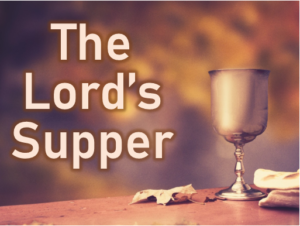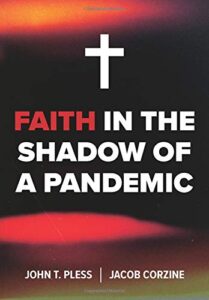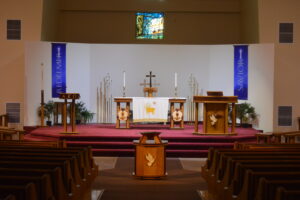 The COVID-19 pandemic that shut down Michigan in March, 2020, changed and challenged many church practices that most of us took for granted. One of the most significant impacts was on the celebration of the Lord’s Supper. Christians have been celebrating the Lord’s Supper for 2,000 years, through plagues, pandemics, wars, and all sorts of calamities, so this is not a new challenge for Christians. It is new, however, to our generation, which has not had so many hurdles set up to receiving the Lord’s Supper in our lifetime. A greater understanding of health and cleanliness also makes our generation distinct in the ways we are challenged by the restrictions of pandemic ministry.
The COVID-19 pandemic that shut down Michigan in March, 2020, changed and challenged many church practices that most of us took for granted. One of the most significant impacts was on the celebration of the Lord’s Supper. Christians have been celebrating the Lord’s Supper for 2,000 years, through plagues, pandemics, wars, and all sorts of calamities, so this is not a new challenge for Christians. It is new, however, to our generation, which has not had so many hurdles set up to receiving the Lord’s Supper in our lifetime. A greater understanding of health and cleanliness also makes our generation distinct in the ways we are challenged by the restrictions of pandemic ministry.
The Lord’s Supper was instituted by Jesus Christ himself, when He celebrated it with His disciples and told them to “Do this in remembrance of me.” (Luke 22:19) We receive in the bread and wine the very body and blood of Christ, given and shed for us for the forgiveness of our sins and strengthening of faith, as well as the pledge of a resurrection life. The Lord’s Supper is something believers crave and hunger for, as it unites us with Jesus and each other. But what happens when a pandemic disrupts our regular reception of the sacrament?
During the stay-at-home orders, many Christians “fasted” from the Lord’s Supper, as did our congregation when we had only livestream services from March through June. Others have been worshipping online this entire year, due to health risks or other concerns. They plan to take the Lord’s Supper again once they have been fully vaccinated. Some have been in nursing homes or facilities where visitors have not been allowed. This past year, many Christians have gone the longest without the Lord’s Supper than ever before since their First Communion.
 The book, Faith in the Shadow of a Pandemic (Corzine & Pless, CPH, 2020) treats the topic of the Lord’s Supper in an entire chapter. In it, they recall from the Scriptures and the Lutheran Confessions that we celebrate the Lord’s Supper from Christ’s institution, and are discouraged from “making stuff up” when it comes to the sacrament. This had already happened in extreme ways during the Middle Ages, when medieval Christianity had a number of innovations regarding the sacrament. They had private masses, reservation of the host, Corpus Christi processions, and reserved the wine for the priests only. These and other inventions were discarded by the Lutheran Reformation, which focused on the words given in Scripture.
The book, Faith in the Shadow of a Pandemic (Corzine & Pless, CPH, 2020) treats the topic of the Lord’s Supper in an entire chapter. In it, they recall from the Scriptures and the Lutheran Confessions that we celebrate the Lord’s Supper from Christ’s institution, and are discouraged from “making stuff up” when it comes to the sacrament. This had already happened in extreme ways during the Middle Ages, when medieval Christianity had a number of innovations regarding the sacrament. They had private masses, reservation of the host, Corpus Christi processions, and reserved the wine for the priests only. These and other inventions were discarded by the Lutheran Reformation, which focused on the words given in Scripture.
In the Smalcald Articles, one of the confessional writings, it states, “If some want to justify their position by saying that they want to commune themselves for the sake of their own devotion, they cannot be taken seriously. For if they seriously desire to commune, then they do so with certainty and in the best way by using the sacrament administered according to Christ’s institution. On the contrary, to commune oneself is a human notion, uncertain, unnecessary, and even forbidden. Such people also do not know what they are doing, because they are following a false human notion and innovation without the sanction of God’s Word. This it is not right (even if everything else were otherwise in order) to use the common sacrament of the church for one’s own devotional life and to play with it according to one’s own pleasure apart from God’s Word and outside the church community.” (SA II II 8-9, Kolb Wengert p. 302-303)
In so many areas of ministry, we have had to be innovative, creative, and flexible to bring God’s Word and fulfill the mission of the church. These, no doubt, have been used by the Spirit for fruitful ministry. However, in the area of the Lord’s Supper, we are much more cautious about making too many changes that would undermine the basic elements of consecration and distribution. Yet even in this, not all churches will be identical in this regard. We try to demonstrate charity and grace to fellow Lutherans who may have decided to make more significant alterations to their consecration and distribution of the Lord’s Supper. All of us were trying our best to adapt to the situation. However, as we move forward, thoughtful reflection and theological discussions will need to be had with a spirit of humility and trust as we seek a faithful way forward.
Celebrating the Lord’s Supper at Our Savior Lutheran Church and School, Lansing, MI

Holy Communion at Our Savior is offered to members of our congregation and to those who have been instructed in the beliefs and practices of our congregation and the Lutheran Church regarding the Sacrament. The practices of our congregation flow from our beliefs regarding what is happening in the celebration of the Lord’s Supper.
According to the Center for Disease Control at that time, touch was not a likely method for transmitting COVID-19. Transmission happens mainly through respiratory droplets breathed into the air, and mucous or saliva droplets spread through sneezing or touching one’s mouth, eyes, nose, etc. This made us focus on the three W’s that were consistent with the health measures that our school ministry had put in place – Wash your hands, Watch your distance, Wear your mask.
All Elders (and all communicants – everyone in worship actually) wash their hands thoroughly before worship and distributing the sacrament. Prior to distribution, pastors and elders use hand sanitizer to ensure our hands are clean before handling the wafers / host and the cups of wine. Masks are worn at all times by those distributing. Those communing may briefly remove their mask to receive the Sacrament. The brief time when communicants remove their mask to receive the sacrament is not a risk factor. We are confident that receiving Holy Communion with these health practices in place is not a source of transmission for COVID-19. The benefits of the Sacrament far outweigh any minute risk from being in person for worship or taking the Lord’s Supper.
The Common Cup is a concern in many people’s minds, and yet in the past it has not really been a source of transmission for colds or the flu. The alcohol in the wine reacting with the precious metals has long thought to mitigate germ transmission. The risk of catching something is very low, especially compared to the high transmission activities like shaking hands. However, since the invention of little individual cups, many people prefer that to the common cup because only the altar guild and pastor distributing touch the cups. The altar guild and the pastor/vicar use rigorous hand washing to ensure that their hands are clean. We are using the common cup only for consecration, and only the individual cups for distribution.
When approaching for Holy Communion, there are hash marks on the carpet of the center aisle. This is so households can keep 6 ft distance from each other while in line to come forward. They may stay together as a family/household while communing at each station.
When approaching the elder to receive the body of Christ, the communicant may remove their mask and lay their palm flat. The elder places the host into their hands and they then place it in their mouth.
When they move over to the wine station, the pastor/vicar sets out the number of individual cups of wine for that family and then steps back. They take the cups and drink the wine as the pastor speaks the words of distribution. There is a cup of white de-alcoholized wine on the tables for those who desire it. After receiving the blood of Christ, they put the empty cups in the baskets as you return to their seats.
We are confident that the distribution of the Lord’s Supper poses extremely low risk for transmission for COVID-19, and that we can receive the Sacrament joyfully, confidently, and in the fellowship of believers as Jesus gives us forgiveness, life, and salvation.
Questions that still remain for the future practice of the Lord’s Supper are: 1) When will we use the rails to kneel for the Lord’s Supper? 2) When will we fill the baptismal font for people to touch on their way to the rail? 3) When will we use the common cup again? These are in addition to the questions about how long we will require masks, distancing, and hand washing and all the other mitigation efforts that have become the new normal. We pray for the Spirit’s continued wisdom and guidance as we move forward in faith, hope, and love.
In addition to in-person worship service and the celebration of the Lord’s Supper as described above, our church staff also brings communion to people’s homes upon request, and to our shut-ins on a monthly basis. A special parking lot service on April 18 will provide yet another opportunity for people to receive the Lord’s Supper if they are not ready to participate at in-person services.
The disruption of these long-held practices forces us to revisit our beliefs and convictions about the Lord’s Supper and Jesus’ intention and institution of it. This can very well lead to a deeper appreciation for the Sacrament, and a renewed understanding of its place in the Christian life. That is the reason for our Sunday morning preaching series in Lent 2021 on various facets of the Lord’s Supper, and the ongoing invitation to gather at the table of the Lord. We pray that the Lord will continue to strengthen and bless our church as He feeds and sustains us, so that we may continue to be the body of Christ in the world.